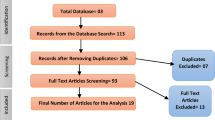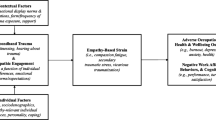Abstract
Purposeof Review
This article explores the emerging role of compassion in the treatment of individuals who have caused sexual harm. It also brings focus to the importance of self-care and self-compassion for the practitioners who do this work.
Recent Findings
Early studies into interventions designed to prevent offending behavior focused more on risk reduction than client resilience and well-being. The good lives model shifted focus to rehabilitation centered on clients' strengths. Recent critiques highlight the importance of compassion in treatment and self-compassion for practitioners working in this field.
Summary
Compassion plays a fundamental role in therapy with clients who have caused sexual harm.
Similar content being viewed by others
Data Availability
This review paper did not rely on data other than in the published papers cited.
References
Papers of particular interest, published recently, have been highlighted as: • Of importance •• Of major importance
Andrews DA, Zinger I, Hoge RD, Bonta J, Gendreau P, Cullen FT. Does correctional treatment work? A clinically-relevant and psychologically-informed meta-analysis Criminology. 1990;28(3):369–404.
Hanson RK, Bourgon G, Helmus L, Hodgson S. The principles of effective correntional treatment also apply to sexual offenders: a meta-analysis. Crim Justice Behav. 2009;36(9):865–91. https://doi.org/10.1177/0093854809338545.
Prescott DS, Willis GM. Using the good lives model (GLM) in clinical practice: lessons learned from international implementations. Aggress Violent Beh. 2021. https://doi.org/10.1016/j.avb.2021.101717.
Yates PM, Prescott DS, Ward T. Applying the good lives and self-regulation models to sex offender treatment: a practical guide for clinicians. Brandon, VT: Safer Society Press; 2010.
Prendergast ML, Pearson FS, Podus D, Hamilton ZK, Greenwell L. The Andrews’ principles of risk, needs, and responsivity as applied in drug treatment programs: meta-analysis of crime and drug use outcomes. J Exp Criminol. 2013;9:275–300. https://doi.org/10.1007/s11292-013-9178-z.
Levenson JS, Willis GM, Prescott DS. Trauma-informed care: transforming treatment for people who have sexually abused. Brandon, VT: Safer Society Press; 2017.
Taylor J. Compassion in custody: developing a trauma sensitive intervention for men with developmental disabilities who have convictions for sexual offending. Adv Ment Health Intellect Disabil. 2021. https://doi.org/10.1108/AMHID-01-2021-0004.
•• Taylor K, Hocken J. Hurt people hurt people: reconceptualising criminogenic need to promote trauma sensitive and compassion focused practice. J Forensic Pract. 2021. Taylor and Hocken have done more than anyone to promulgate compassion-focused therapy in forensic practice. This article not only summarizes the key points of their approach but also outlines the results of scientific inquiries into compassion-focused therapy.
Substance Abuse and Mental Health Services Administration (2014). SAMHSA’s concept of trauma and guidance for a trauma-informed approach. Retrieved March 27, 2022, from https://store.samhsa.gov/sites/default/files/d7/priv/sma14-4884.pdf.
Kornfield J. The wise heart: A guide to the universal teachings of Buddhist psychology. New York: Bantam; 2009.
Miller WR, Rollnick S. Motivational interviewing: helping people change (3rd ed.). Guilford Press. 2013.
Prescott DS. Motivational interviewing: as easy as it looks? Curr Psychiatry Rep. 2020;22:35. https://doi.org/10.1007/s11920-020-01158-z.
•• Gilbert P. Compassion: from its evolution to a psychotherapy. Front Psychol. 2020;11:3123. Gilbert is the original developer of compassion-focused therapy. His recent work, much of which is summarized in this article, illustrates why a focus on compassion can help individuals to develop more prosocial lives as well as enhancing well-being.
Steindl S. The gifts of compassion: how to understand and overcome suffering. Samford Valley, Australia: Australian Academic Press; 2020.
Beech A, Fordham AS. Therapeutic climate of sexual offender treatment programs. Sex Abus. 1997;9:219–37.
Walfish S, McAlister B, O’Donnell P, Lambert MJ. An investigation of self-assessment bias in mental health providers. Psychol Rep. 2012;110:639–44.
•• Devenish-Meares P. Self-care for the stressed at work: humility, detachment and self-compassion as key enablers of healing and hope. Academia Letters. 2021. https://doi.org/10.20935/AL4515. This article examines the literature with respect to self-care in the workplace and arrives at the three overarching principles mentioned in this article. While much has been written about the importance of self-care, this article is among the first to examine the various components that make it up.
Author information
Authors and Affiliations
Corresponding author
Ethics declarations
Conflict of Interest
The author declares no competing interests.
Human and Animal Rights and Informed Consent
This article does not contain any studies with human or animal subjects performed by any of the authors.
Additional information
Publisher's Note
Springer Nature remains neutral with regard to jurisdictional claims in published maps and institutional affiliations.
This article is part of the Topical Collection on Sexual Disorders
Rights and permissions
Springer Nature or its licensor (e.g. a society or other partner) holds exclusive rights to this article under a publishing agreement with the author(s) or other rightsholder(s); author self-archiving of the accepted manuscript version of this article is solely governed by the terms of such publishing agreement and applicable law.
About this article
Cite this article
Prescott, D.S. Self-compassion in Treatment and with Ourselves. Curr Psychiatry Rep 25, 7–11 (2023). https://doi.org/10.1007/s11920-022-01401-9
Accepted:
Published:
Issue Date:
DOI: https://doi.org/10.1007/s11920-022-01401-9




